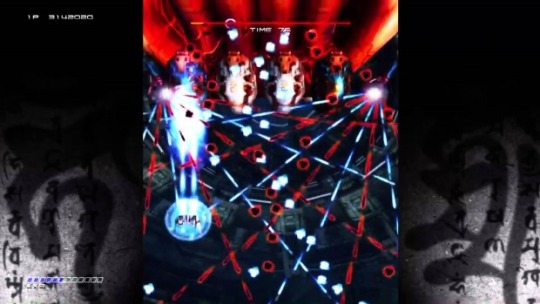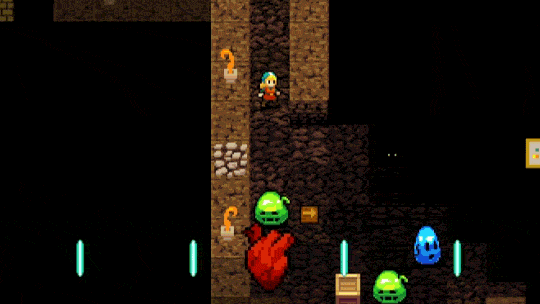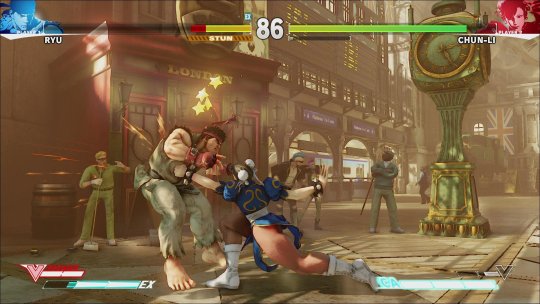How Is A Game Difficult?
Games can be difficult in many different ways, lets explore a couple.

When we talk about difficult games we have the unfortunate tendency to talk about them as though they are all difficult in the same way, or as though there is only one kind of difficult. The Binding of Isaac is difficult, so is Dark Souls, so is Enter the Gungeon, Ikaruga, Dwarf Fortress, and Civilization. But while the "Difficult" label can be safely applied to all these games the ways in which they are difficult varies dramatically.

This isn't to say that "difficult" isn't useful as a label, but it isn't enough. The label is hiding worlds of complexity. (IMG)
Ikaruga is hard. Very hard. It's a shoot 'em up that has at its core a simple system where your ship swaps between red and blue and can only be damaged by the opposite color bullets that the enemy shoots. This adds a whole new level of complexity to the bullet hell the game throws you into because you can't dodge all the bullets. You have to dodge some and absorb others, carefully swapping between red and blue as needed. This game is difficult because there is so much going on and there is so much that you need to keep track of. As the game goes on and gets harder it tends to get harder by throwing more at you and giving you less time to react to it all. Given time to stop and think the choices you have to make aren't all that difficult, but you aren't given time to think. You have to rely on muscle memory to get you through.
In Chess, on the other hand, there is no time limit. You can take your time and think through each and every move. The game isn't a test of your reaction time but instead the challenge lies in the complexities of the choices you are asked to make. There are no surprises, you know well in advance every move your opponent is capable of making and in theory there is no chance involved. But there is simply so many things that are possible that it strains the mind to hold all the possibilities for even a couple of turns in your head.
Both games are very difficulty, but they are difficulty in fundamentally different ways.
Crypt of the Necrodancer is a game that takes the roguelike and dungeon crawling aspects of games like the Binding of Isaac and combines them with rhythm games. You explore, kill, and loot, but it all must be done to a beat. Your actions must take place on the beat and enemies also only move on the beat. If you fail to keep the beat you are penalized.

Think quick but act constantly. You can't let the adrenaline take you the way you would with other action games, you have to be in control the whole time. (GIF)
A lot of the difficulty in this game comes from having to make complex choices in a very limited amount of time. But there are 2 sides to having to keep the beat, and while it is easy to focus on how it forces you to quickly make choices lets not forget that it also forces you to slow down. Time is inherently subjective to humans, a good meal can take no time at all and a bad one can take forever. In a game like Crypt of the Necrodancer it is easy to let your adrenaline kick in and start going faster and faster, but the game doesn't want you to go as fast as you can. It wants you to stay in control and keep the beat. The game requires quick thinking, but also consistency and precision.
Dark Souls is a series that frequently uses a very similar trick. A lot of the time if you are having trouble dodging an attack it is because you dodged to early. You saw the attack start and you instantly tried to roll out of the way, only the attack is slow and so by the time the attack actually lands the invincibility frames on your roll are over. Many games will let you roll continuously because they value only that you react to an enemy attack. Dark Souls doesn't just want you to have seen the attack but it also wants you to have also assessed it and reacted at the appropriate time. If you simply let yourself react without thought then you are just going to get squished. These games find difficulty not in making you react as fast as possible but in forcing you to overcome your natural reactions.
We must also consider how a game scales up the difficulty. As the game progresses and gets harder it needs to get harder in a way that keeps the source of challenge the same. Do enemies get smarter, faster, deal more damage, or do they just take more hits to kill. Making enemies better and better bullet sponges might make sense for a game that is about the scarcity of resources since that means you have to burn more resources to kill every enemy. Doing that for a game that wants to emphasizes skill or timing might not make sense though. In those we might want to focus on introducing new attack patterns that need to be learned and mastered. Chess is always hard because there is an overwhelming amount of complexity, regardless of how good you are at the game. As such playing chess at high and low levels feels the same.
Crypt of the Necrodancer will change the tempo (speeding it up or slowing it down) and some songs require you to do things like skip every 8th beat. This keeps staying on tempo hard at all levels of play. Because of this the choices and challenges of someone who is new to the game are going to be fundamentally the same as someone who has sunk hundreds of hours into it.

A problem with a lot of fighting games is that at lower levels of skill the game's primary source of difficulty comes from the mechanical difficulty of being able to input the complex commands on demand while at higher levels of play the game is more about positioning, reading your opponent, and your reaction time. It’s like if the game started out as QWOP and eventually became chess. You will miss out on all the players who like chess but don’t want to invest months training in QWOP in order to play it. (IMG)
There are many more kinds of difficulty. Golf, for example, is a great example of a game whose difficulty lies in a mechanical challenge. Crypt of the Necrodancer though finds it's difficulty in timing and precision. You can make things harder by forcing the player to slow down, to force then to have to wait for the right moment when waiting is the scariest thing in the world.
Read more about:
BlogsAbout the Author(s)
You May Also Like













